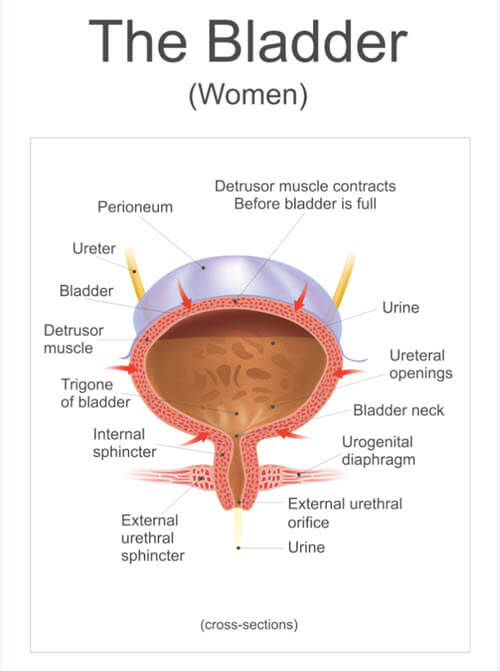The Women's Center for Bladder and Pelvic Health specializes in caring for women with pelvic floor disorders such as Urinary Incontinence and Pelvic Organ Prolapse. Women of all ages and races can suffer from bladder and pelvic floor disorders. The pelvic floor is a combination of muscles, ligaments and connective tissues that support the pelvic organs - the bladder, vagina, uterus and rectum. The pelvic floor can be weakened by a combination of factors such as childbirth, heavy lifting, the effects of menopause and aging, and other chronic medical and neurologic conditions. Although problems do become more common with advancing age, even young women can be affected.
Pelvic Floor Disorders We Treat
In a private, confidential setting, evaluation and treatment is available for all of the following conditions:
- Urinary incontinence (leaking of urine)
- Overactive bladder symptoms
- Nocturia (awakening several times each night to void)
- Fecal incontinence (passing of gas or stool involuntarily)
- Pelvic organ prolapse (weakening of pelvis muscles)
- Voiding disorders such as urinary retention
- Recurrent Urinary Tract Infections
- Genitourinary syndrome of Menopause (menopause related vaginal symptoms)
- Painful Bladder Syndrome and Pelvic Pain
- Voiding disorders such as urinary retention
- Pain with Intercourse
- Constipation
- Genitourinary or rectal fistula
Our Services
We offer a comprehensive blend of services to bring relief for the conditions listed above.
Sometimes simple changes and interventions can have a significant impact on daily quality of life. A urogynecologist may advise conservative (non-surgical) or surgical therapy depending on your wishes, the severity of your condition and your general health. Conservative options include medications, pelvic exercises, behavioral and/or dietary modifications and vaginal devices (also called pessaries). Pelvic Floor Therapy with Biofeedback is another treatment that your urogynecologist may recommend. Safe and effective surgical procedures are also utilized by the urogynecologist to treat incontinence and prolapse. These include minimally invasive same day surgeries such as mid-urethral slings or da Vinci Robotic Surgery.
Our goal is to restore function and improve quality of life for every woman. To do this we use the most current research and clinical standards to create individualized treatment plans that may include behavioral, medical, non-surgical, and surgical options.
Urodynamic Testing
Your urogynecologist will evaluate the results of your urodynamic tests to determine if your bladder is functioning normally and recommend appropriate treatment, if needed.
Treatment Options
Our goal is to restore function and improve quality of life for every woman. To do this we use the most current research and clinical standards to create individualized treatment plans that may include behavioral, medical, non-surgical, and surgical options. In addition our experts offer Robotic Assisted Surgery utilizing a dual-console da Vinci ® Surgical System for procedures.
- Behavioral changes. Cutting back on fluids can be helpful in preventing sudden bladder urges or excess leakage.
- Kegels. These exercises can help strengthen pelvic muscles that have been weakened by pregnancy, childbirth, surgery, aging and being overweight. View the Kegels and bladder training flyer from the American Urogynecologic Society.
- Weight Loss can improve urinary incontinence.
- Medication. For more severe incontinence, medication can reduce the symptoms or muscle spasms associated with the condition.
If these treatments do not help to control your urinary incontinence, your doctor may recommend specialized treatment. These options include:
- Sling Surgery. If you are suffering from moderate to severe stress urinary incontinence, your doctor may recommend sling surgery. Sling surgery uses a piece of body tissue or a synthetic material to create a hammock-like cradle to support the urethra. The procedure provides support for your bladder neck and helps prevent involuntary urine leakage when coughing, sneezing, laughing or exercising.
- Sacral Nerve Modulation. If medication does not help to control your urge incontinence or is not the best option for you, your doctor may recommend the Sacral Nerve Modulation. SNM is a small, surgically implanted device that is programmed to provide mild electrical stimulation to your sacral nerves at the base of your tailbone. The sacral nerves are responsible for sending messages to your brain related to bladder and urinary function. The electrical stimulation helps to improve communication between the brain and the sacral nerves so your bladder and pelvic floor muscles can function properly



















